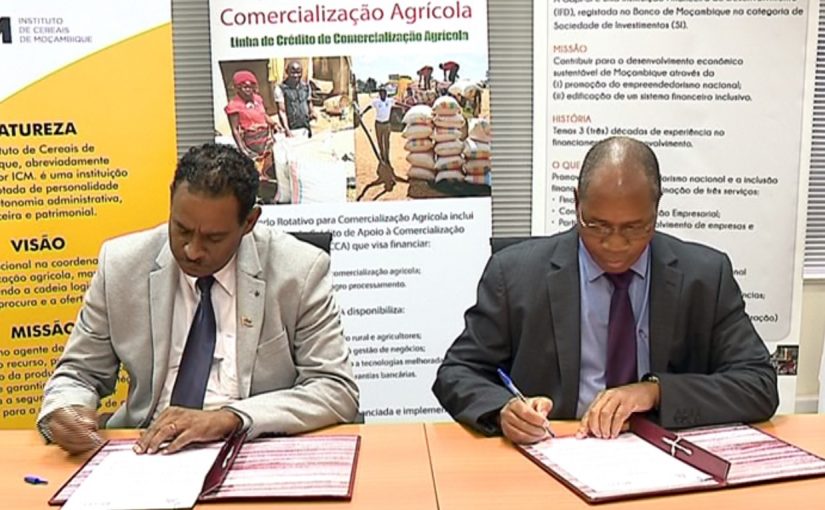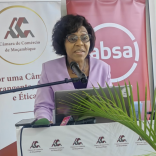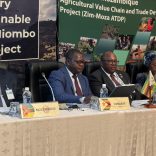Mozambique: New factory in Gurue will end dependence on imported animal feed
ICM and Gapi support agricultural marketing in Mozambique

Picture: TVM
The Rotating Agricultural Marketing Fund (FRCA) approved by the Council of Ministers on 26 February and managed by the Cereals Institute of Mozambique (ICM), this week doubled its capitalisation to 90 million meticais.
ICM and Gapi have agreed to offer a special small-scale agricultural trade credit line (LCCA), which in just six months has already granted financing of nearly 50 million meticais, funding the purchase of around 13,500 tons of miscellaneous production from more than 23,000 households, with corn accounting for 62% of the total.
To enable more farmers to take full advantage of the various crops they produce for the market, ICM and Gapi recently signed an addendum to the agreement, increasing their financial contributions with another 40 million meticais.
In addition to commercialisation, the ICM-Gapi partnership also intends investing in agro-processing and technical assistance programmes which empower rural operators and improve their access to technologies and commercial banking financial services.
Mohamed Valá, Director General of ICM and Chairman of the LCCA Steering Committee, said at the time of the signature of the addendum that “on behalf of the Ministry of Industry and Trade (MIC) we reiterate our commitment, with all its determinants, namely (i) cooperation, partnership and mutual understanding for the development of our populations, especially those living in the rural world; (ii) that of credit, so our producers and other players can assume that our commitment is irreversible; and (iii) so that local governments can take on this initiative, even if it does not involve huge sums. We are setting an example, which we hope other institutions will feel comfortable joining in with.”
Valá has pledged that ICM and MIC will continue to work and mobilise resources because, he believes, “this is the path which will lead us to higher levels of rural development, because it induces financial inclusion, empowers women, youth and the entire local environment.”
“We believe that in the next governance cycle, we will quickly reduce poverty, because we will bring financial backing to producers who lack a market for their production – their main challenge. We have to enable producers to produce surpluses and make money from their activity,” he added.
This enhanced cooperation between a public and a public-private institution is the result of the success that is already being achieved by this already effective strategy in some regions of the country.
In fact, six months after its launch, rural traders from the provinces of Niassa, Cabo Delgado, Nampula, Tete, Zambezia, Manica and Inhambane have already received funding for the marketing of various products, including corn, beans, soybeans, sesame and peanuts.
On behalf of Gapi shareholders, António Souto of the Strategic Management Unit said that this activity meets one of the mandates of the institution, namely to seek and design solutions through a network of institutional cooperation.
“Today we demonstrate that the solution to the development problems facing Mozambique must be promoted through concrete measures and through cooperation between existing institutions,” he said, stressing that: “the concrete act of strengthening the LCCA demonstrates the validity of the principle. I am grateful for the initiative and commitment of the ICM Board representing the Government of Mozambique in believing in national institutions to implement this service, which is not only financial, but also of assistance and promotion of entrepreneurs, some in remote parts of the country.”
Concluding, Adolfo Muholove, chairman of the Gapi-SI Executive Committee, revealed that other partnerships were underway, and pointed out: “This house is open to other institutions, so that we can pass the message to national decision makers and cooperation partners about the need and value of partnerships among national institutions in meeting the challenges that Mozambique faces.”
In addition to technicians from both institutions, the ceremony was attended by Augusto Isabel, the Director General of FARE (Economic Rehabilitation Support Fund), with whom Gapi has a cooperation agreement aimed at bringing financing solutions to low-income segments and support for micro institutions in an effort to make rural ‘bankarisation’ and consequent financial inclusion a reality.













Leave a Reply
Be the First to Comment!
You must be logged in to post a comment.
You must be logged in to post a comment.